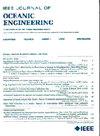基于时间相关性和信息传递的稀疏贝叶斯学习水下声学通信信道估计
IF 3.8
2区 工程技术
Q1 ENGINEERING, CIVIL
引用次数: 0
摘要
为了减少观测数据不足时单载波时域均衡(SC-TDE)的误差传播,本文提出了一种基于报文传递的低复杂度 SC-TDE 算法。首先,利用子块之间的时间相关性(TC)来提高传统基于消息传递的稀疏贝叶斯学习(SBL)在数据不足时的性能。然后,提议的算法将信道估计过程建模为隐马尔可夫模型。它通过利用一阶自回归模型来捕捉 TC 特性,从而利用前一个子块的先验信息来支持当前子块。通过使用信念传播(BP),得出了基于 TC 和 BP 的 SBL 算法(TC-BP-SBL),然后对其进行近似处理,得到了计算复杂度更低的基于 TC 和近似-信息传递的 SBL 算法(TC-AMP-SBL)。最后,利用 AMP 和期望传播 (EP) 的优势,引入了一种用于联合信息传递的双层迭代均衡算法。内层迭代使用 AMP 进行符号估算,外层迭代通过基于确定性近似变分推理的 EP 提高均衡性能。利用第 11 次中国北极科学考察期间收集的数据对所提出的算法进行了验证。结果表明,所提出的算法能显著降低 SC-TDE 的计算复杂度,并能在观测数据不足时有效缓解误差传播。本文章由计算机程序翻译,如有差异,请以英文原文为准。
Temporal Correlation and Message-Passing-Based Sparse Bayesian Learning Channel Estimation for Underwater Acoustic Communications
To mitigate the error propagation of single-carrier time-domain equalization (SC-TDE) with insufficient observation data, this article proposes a low-complexity message-passing-based SC-TDE algorithm. First, the temporal correlation (TC) between subblocks is exploited to improve the performance of conventional message-passing-based sparse Bayesian learning (SBL) when the data are insufficient. The proposed algorithm then models the channel estimation process as a hidden Markov model. It captures the TC property by utilizing a first-order autoregressive model, thus supporting the current subblock with a priori information from the previous subblock. By using belief propagation (BP), the TC and BP-based SBL algorithm (TC-BP-SBL) is derived, which is then approximated to obtain the TC and approximation-message-passing-based SBL (TC-AMP-SBL) with lower computational complexity. Finally, taking advantage of AMP and expectation propagation (EP), a two-layer iterative equalization algorithm is introduced for joint message passing. The inner iteration uses AMP for symbol estimation, and the outer iteration improves the equalization performance by EP based on deterministic approximate variational inference. The proposed algorithm is validated using data collected during the 11th Chinese Arctic Scientific Expedition. The results show that the proposed algorithm can significantly reduce the computational complexity of SC-TDE and effectively mitigate error propagation when the observation data are insufficient.
求助全文
通过发布文献求助,成功后即可免费获取论文全文。
去求助
来源期刊

IEEE Journal of Oceanic Engineering
工程技术-工程:大洋
CiteScore
9.60
自引率
12.20%
发文量
86
审稿时长
12 months
期刊介绍:
The IEEE Journal of Oceanic Engineering (ISSN 0364-9059) is the online-only quarterly publication of the IEEE Oceanic Engineering Society (IEEE OES). The scope of the Journal is the field of interest of the IEEE OES, which encompasses all aspects of science, engineering, and technology that address research, development, and operations pertaining to all bodies of water. This includes the creation of new capabilities and technologies from concept design through prototypes, testing, and operational systems to sense, explore, understand, develop, use, and responsibly manage natural resources.
 求助内容:
求助内容: 应助结果提醒方式:
应助结果提醒方式:


